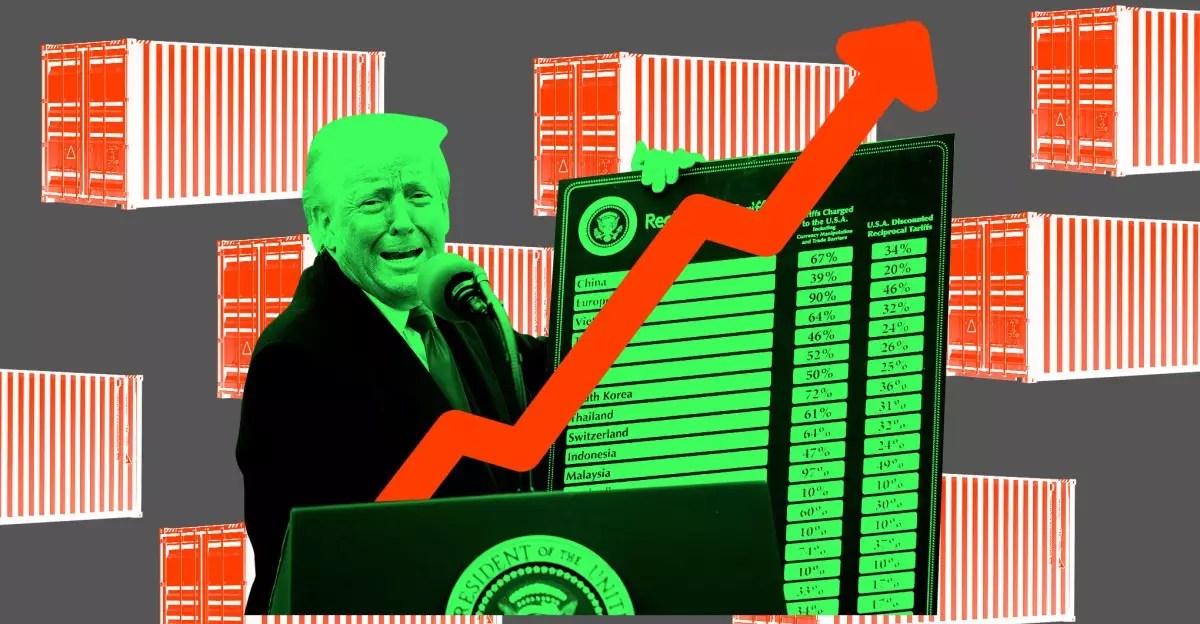The intricate dance between government policies and major technology firms has reached a precarious tipping point. The United States has positioned itself as both a champion and adversary to some of the most influential companies in the world, including Meta, Apple, Tesla, and TikTok. Initially, many anticipated that a Trump administration would be a boon for Big Tech, with its promises of deregulation and support for American business interests. However, the landscape has shifted dramatically, turning these corporate giants into chess pieces on the global trade board. The latest remarks from European Commission President Ursula von der Leyen about possibly levying taxes on the advertising revenues of digital services serve as both a warning and a potential consequence of escalating tensions between the U.S. and Europe.
This unexpected pivot toward punitive measures against tech giants signifies a reversal of fortunes for leaders like Mark Zuckerberg, who once viewed U.S. leadership as a potential shield against overreach by foreign governments, particularly in the European Union. Instead, the steady stream of fines and compliance issues facing companies like Meta and Apple under EU regulations reveals a fissure in the relationship that threatens to undermine the very foundations of corporate trust.
The Implications of Trade Tensions
Trade tariffs are no longer mere economic tools; they have morphed into strategic weapons that can reshape entire industries. With the U.S. employing aggressive tariffs aimed at China, companies like Tesla and TikTok are finding themselves in increasingly dire straits. Tesla’s market challenges, including a staggering decline in stock value, emphasize the unpredictable volatility characterized by current economic relations. The decision to halt the sale of U.S.-made vehicles in China reflects a broader trend within the tech sector where geopolitical skirmishes have tangible impacts on product availability and pricing.
For TikTok, the stakes are even higher. Any notion of normal operations feels increasingly out of reach as the platform navigates a political minefield. Chinese officials have expressed their resistance to perceived infringements on market economics, claiming that punitive measures infringe upon the rights of legitimate businesses. The disarray within the negotiations and stalled acquisitions threatens TikTok’s very survival in the U.S. market and raises alarms about the globalization of tech and its intertwined fates with international relations.
Big Tech: The New Collateral Damage
The staggering reality is that the tech industry has become a bargaining chip in broader diplomatic discussions. During times of relative peace, these companies thrive and push boundaries. However, when relations sour, their influence becomes a double-edged sword, exposing them to manipulation from governmental forces. This duality exposes the vulnerability of our digital giants; they oscillate between being heralded as innovators and being targeted as pawns in more extensive political games.
The escalation of scrutiny towards OpenAI serves as an illustrative example of this growing unrest. As the company transitions away from its original nonprofit model, it faces backlash from former employees and industry insiders concerned about ethical boundaries. Has OpenAI successful blurred the lines between a charitable mission and profitability? With so much at stake, as advancements in artificial intelligence create both advances and ethical dilemmas, skepticism looms large.
Furthermore, Google’s layoffs signify another layer of complexities inherent to Big Tech. As companies adjust and recalibrate amid economic uncertainties, how they handle their workforce has become a contentious issue. Employees express shock and bewilderment over the company’s severance terms, pointing to the ever-evolving relationship between employers and workers in the tech space—one that increasingly mirrors traditional corporate hierarchies.
Diverse Challenges on the Horizon
The tech landscape is riddled with conundrums ranging from layoffs to ethical debates surrounding AI development. Microsoft recently faced backlash after firing employees for protesting, a scenario that painfully underscores the struggles workers face within these powerful corporate frameworks. Meanwhile, innovations like Waymo’s expansion into urban environments highlight how technology companies continue to push boundaries, even as they navigate this turbulent waters.
As we peer into the future, one must ponder whether technology firms can adapt and thrive amidst such heightened scrutiny from both governmental entities and the public. The dialogues around job changes, potential monopolization, and the ethics of AI usage are just the beginning of a larger conversation about how power and influence will be redefined in the digital age.
In essence, as the lines between geopolitics and Big Tech blur, it becomes increasingly apparent that the challenges facing these corporations are complex and multifaceted. Each maneuver they make not only affects their companies but also casts a long shadow on the global stage, prompting us to question the future of innovation in a world rife with competing interests and conflicting narratives.


Leave a Reply